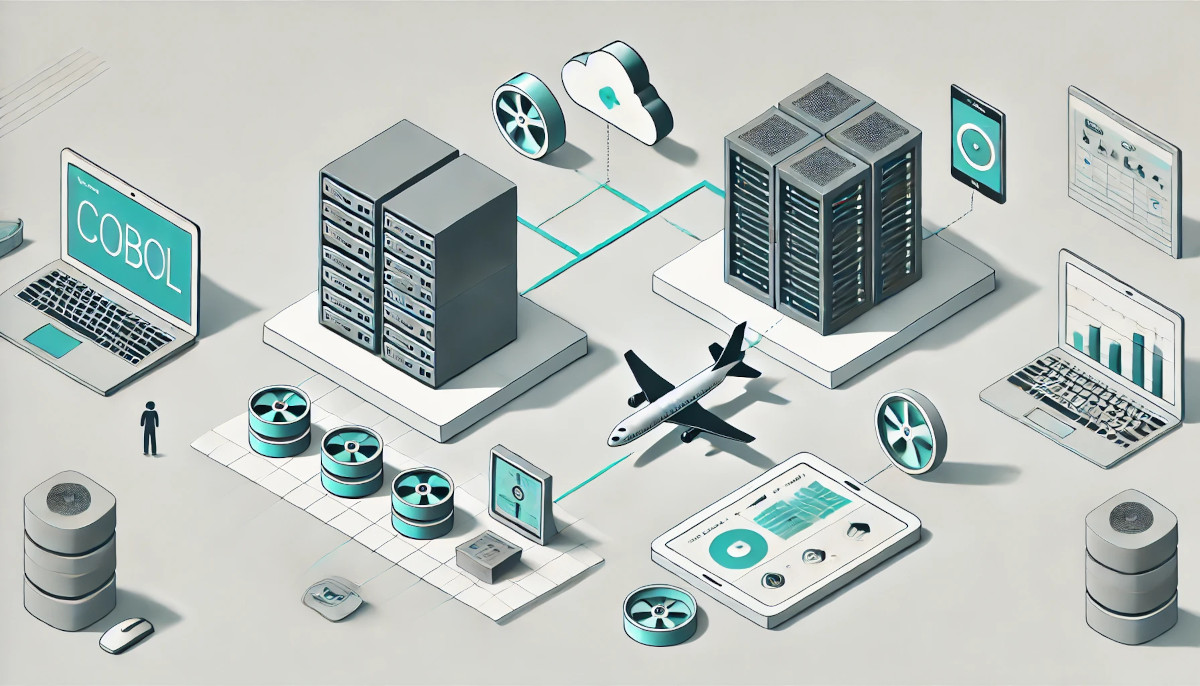How COBOL Modernization Is Powering the Future of Aviation Systems

COBOL in the Sky
Aviation is a high-stakes industry where downtime is measured not just in dollars, but in grounded flights, missed connections, and reputational damage. Behind the scenes, many of the world’s largest airlines, airport operators, and air traffic management systems still depend on COBOL—a language developed in the 1950s—to run mission-critical operations. From passenger booking and crew scheduling to baggage tracking and aircraft maintenance logs, COBOL is deeply embedded in aviation infrastructure. But as the sector faces surging passenger demand, stricter compliance standards, and mounting cybersecurity risks, modernizing these legacy systems has become an urgent priority.
Why COBOL Still Dominates Aviation IT
COBOL earned its place in aviation due to its reliability, performance, and ability to handle massive transaction volumes. It powers Passenger Service Systems (PSS), flight booking engines, frequent flyer programs, and even air traffic control applications. These systems have evolved incrementally over decades and contain deeply customized business logic that is difficult to replicate or replace.
However, what once was an asset is now a liability. These systems are often monolithic, undocumented, and incompatible with modern tools. They lack real-time responsiveness, struggle to integrate with mobile apps and APIs, and cannot support advanced analytics or AI-driven decision-making. Still, organizations continue to rely on them because the risk of disrupting flight operations is too high.
Turbulence Ahead: What’s Forcing Aviation Modernization
The aviation industry is being hit by a perfect storm of modernization drivers:
- Security Vulnerabilities: Many COBOL systems lack encryption, multi-factor authentication, or audit trails, making them attractive targets for ransomware attacks.
- Regulatory Pressures: Aviation regulators like the FAA, EASA, and ICAO are rolling out new mandates requiring real-time reporting, cybersecurity readiness, and digital interoperability.
- Systemic Talent Loss: The number of engineers fluent in COBOL is dwindling rapidly. As they retire, institutional knowledge is lost, increasing the risk of catastrophic system failures.
- Digital Expectations: Airlines and airports must deliver real-time updates, mobile check-ins, dynamic pricing, and AI-powered customer service. Legacy systems cannot meet these demands without significant upgrades.
Modernization isn’t just a matter of efficiency anymore—it’s essential to keeping planes flying and passengers safe.
The High Cost of Staying Grounded
Maintaining outdated COBOL-based systems can cost 20–30% more annually than modern platforms. Aviation IT teams often spend millions each year just to “keep the lights on” while struggling to hire and retain legacy-skilled talent. The real cost, however, lies in the missed opportunities and mounting risks:
- Downtime: System outages lead to canceled flights, delayed maintenance, and passenger disruption.
- Integration Failures: Legacy systems can’t connect with IoT sensors, mobile apps, or cloud-based customer service tools.
- Reputational Damage: A single failure in baggage tracking or check-in systems can go viral, undermining brand trust.
- Regulatory Penalties: Non-compliance with ICAO, FAA, or GDPR mandates can lead to multi-million dollar fines and operational restrictions.
Delaying modernization increases exposure to these risks exponentially.
What Modernization Looks Like in Aviation
COBOL modernization doesn’t require tearing out legacy systems overnight. Leading aviation organizations are adopting incremental modernization strategies to minimize disruption while maximizing impact:
- AI-Powered Refactoring: Using intelligent automation to translate COBOL code to modern languages like Java or C#.
- Cloud Migration: Offloading backend processes to scalable, resilient cloud platforms while maintaining mainframe interoperability.
- API Enablement: Wrapping legacy functions in modern RESTful APIs to integrate with customer apps, airline portals, and airport systems.
- Parallel Testing: Running modernized systems alongside legacy systems to validate functionality and ensure safe transitions.
- Digital Twin Integration: Creating real-time models of flight operations, maintenance, and crew scheduling to enable predictive insights.
These approaches offer a safer, faster route to modernization without grounding core operations.
AI as the Copilot: Why It Matters
Modernizing COBOL without AI is like navigating a 747 with paper maps. The scale and complexity of legacy aviation systems make manual modernization impractical. AI tools like those built into CodeAura accelerate the process by:
- Automating 60–80% of code conversion from COBOL to modern architectures.
- Capturing undocumented business logic buried in millions of lines of code.
- Generating technical documentation in human-readable formats.
- Identifying dependency chains that impact flight operations, maintenance systems, and gate scheduling.
AI doesn’t just speed up the process—it ensures accuracy, reduces human error, and captures institutional knowledge that would otherwise be lost with retiring engineers.
How CodeAura Helps Aviation Clients Modernize Safely
CodeAura is purpose-built to help aviation organizations modernize their COBOL systems without jeopardizing operations. Our aviation-centric capabilities include:
- End-to-End Modernization Frameworks for reservation systems, cargo handling, crew management, and airport operations.
- Compliance-Aware Architecture aligned with FAA, EASA, GDPR, and IATA standards.
- Real-Time Refactoring Agents that ensure 24/7 continuity for flight-critical applications.
- Integration with Aviation Ecosystems including Sabre, Amadeus, SITA, and airport management platforms.
- Domain-Specific Playbooks that map out risk-free modernization roadmaps tailored to aviation stakeholders.
Whether you’re managing flight logistics, baggage automation, or digital passenger experiences, CodeAura delivers modernization that meets mission-critical aviation demands.
Elevate Your Legacy Systems Before They Ground You
In the high-velocity world of aviation, legacy systems are fast becoming unsustainable. Modernization is no longer a choice—it’s a business imperative. Airlines, airports, and aviation tech providers must embrace AI-powered COBOL transformation to stay compliant, competitive, and connected.
Discutons de Vos Systèmes COBOL — Planifiez une session stratégique avec CodeAura.

